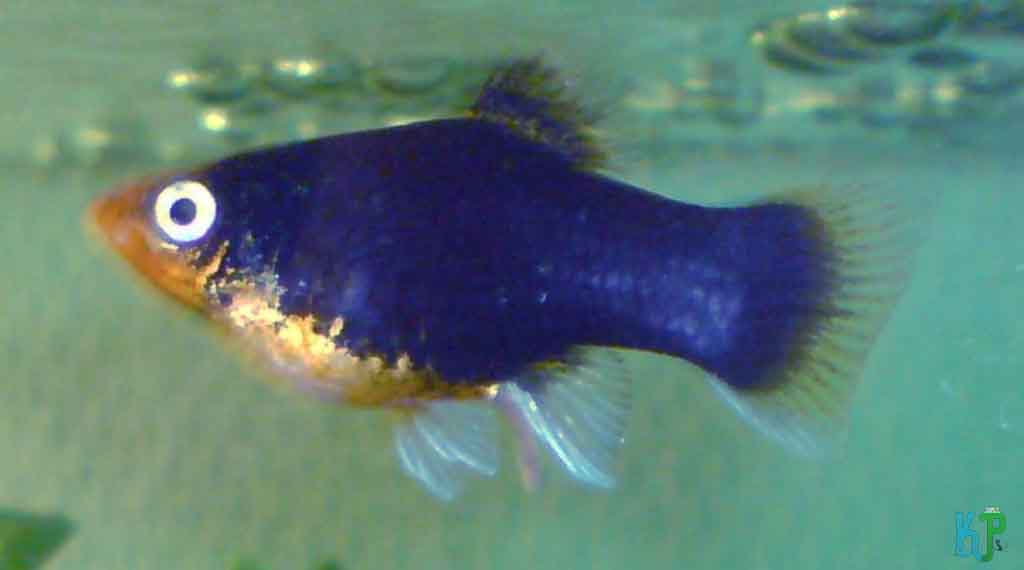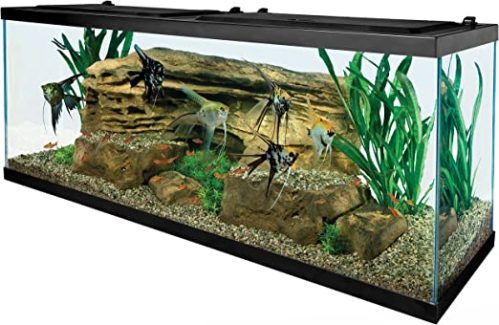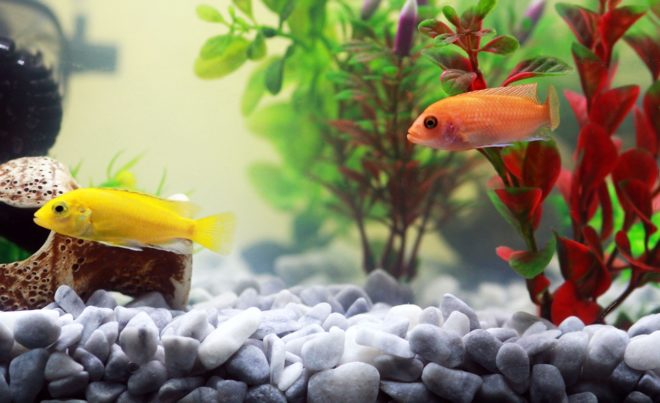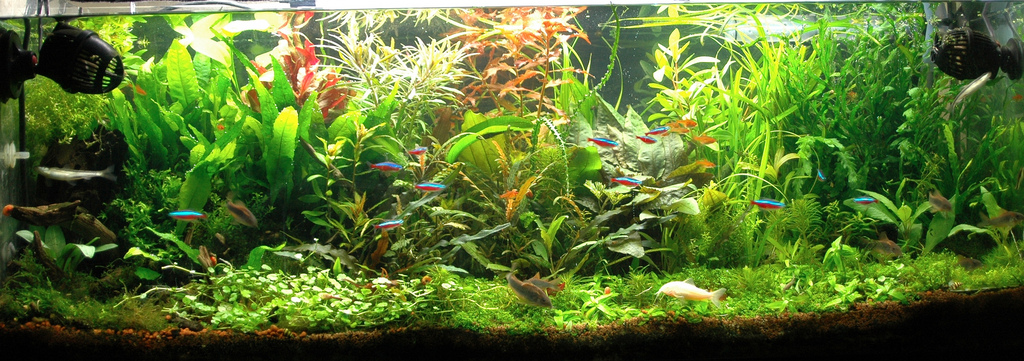Are you in search of a colorful, active, hardy fish that is easy to breed? Then the platy fish, also known as platies, might be the species you are looking for. Platy fish are freshwater fish in the Xiphophorus genus from the xiphophorus species which includes the xiphophorus maculatus (southern platyfish) and xiphophorus variatus (the variable platy). They can generally be found in the regions of the east coast of Central America and Southern Mexico.
Platy fish are livebearers, which is a characteristic feature of organisms of the family Poeciliidae that the species belongs to. The xiphophorus species so frequently interbreed that most specimens traded in the market are mixed hybrids.
Platy fish Care Guide

| Scientific Name: | Xiphophorus maculatus |
| Common Names: | Red Wagtail Platy, Red, Mickey Mouse Platy, Red Tuxedo, Moon Fish, Southern Platyfish, Topsail Rainbow |
| Group: | Freshwater |
| Origin / Habitat: | Central America |
| Swimming Region: | Mid-Range |
| Size: | 2 inches (5 cm) |
| Care Level: | Easy first fish for freshwater fish beginners |
| PH: | 7 – 8 |
| Temperature: | 65°F – 77°F (18°C – 25°C) |
| Water Hardness: | 10° to 25° dH |
| Aquarium Size: | Small, Medium |
| Suitable Tank Mates: | Gouramis, Barbs, Corydoras Catfish, Mollies, Swordtails, Guppies, Tetras |
| Temperament: | Community |
| Life span: | 2 – 3 years |
| Price: | $3-$5 |
Platy fish : Appearance
Platies are small fish that generally only grow to a max length of 2.8 inches (about 7 cm). They are distinguished by a pointed nose, large eyes, and a somewhat thick body mass, stretching from their nose to their dorsal fin.
In terms of sexual dimorphism (the difference between the male and the female of the same species not directly involved in reproduction), there isn’t much of a disparity. The caudal fin in males is a bit more pointed, as well as the anal fin has evolved to a structure called gonopodium, and serves a pivotal role in the reproductive process of the platy fish. Meanwhile, in females, the anal fin is shaped like a fan.
Platy fish: Color Patterns
Platies are visually pleasant fish, with a vast variety when it comes to their coloring; yellow, blue, red, orange, and white, each topped with its own combination of color variants in the form of different patterns. Some of the pattern types include:
- Wagtail Pattern: Characterized by black fins and black tail.
- Mickey Mouse Pattern: Though quite rare, this pattern gets its name due to the Mickey Mouse-shaped markings close to its tail.
- Sunburst Pattern: This is one of the most common platy fish patterns. It is characterized by a bright yellow front half, with an intensely red rear half. The seamless transition between the two colors in the middle creates the effect of a sunset.
- Rainbow Pattern: This pattern is characterized by multiple colorations at the same time.
- Red Coral Pattern: This is characterized by a vibrant red coloration, its body, fins, and tails are all red.
Keeping Platy fish In An Aquarium
Platies are from Central America and are therefore conditioned to live in waters with temperatures that are at least close to those of tropical waters. They do well with temperatures of about 21 C (70 F) to 27 C (81 F) range. Maintaining temperature within this range is very vital since sudden temperature swings are extremely stressful and potentially fatal for the fish. In order to stabilize the temperature range, a tank heater for the platy fish’s aquarium is necessary.
Water hardness should be between 10-28dGH, while water pH should be in the range of 6.8 to 8. It is also important to keep plants in the tank where the platyfish reside. as it enables the fish to feel more at home. Ideal plants include duckweed, Java moss, etc. Since platy fish are surface swimmers, floating plants are probably the best choice for inclusion in their tanks.
In order to enable healthy and sustainable growth of the platy fish, the tank must allow for their ability to grow to their full size. As with many other fish breeds, reducing the room in which the platyfish live, can prohibit their organs from correctly corresponding to growth from the rest of their body, causing them to have a fatal condition.
Tetra 55 Gallon Aquarium Kit with Fish Tank
– LARGE ENVIRONMENT: Larger environments can house more fish or a greater variety of fish.
– ACTUAL TANK DIMENSIONS: 48.25″ L x 12.80″ W x 20.90″ H.
Platy fish: Nutritional Needs
Platy fish are omnivorous, so when it comes to food they aren’t picky. This also means that they should be fed a wide variety of foods. Great choices for food variants include high-quality flakes, freeze-dried foods, pellets, and frozen foods. This will enable them to receive a complete diet with all of the necessary vitamins and nutrients these fish need to stay healthy and robust.
Adult platy fish be fed once daily while feeding younger platies can be done in two or free small meals in a day’s span. However, if long strings of poop are perpetually dangling from your platyfish behind, it is a sign of overfeeding, so you might want to consider cutting down their meal portion at such times, especially as they mature to adulthood.
When we refer to platy fish as omnivores, please understand that this also makes them carnivorous. If they are starved enough, it is possible that the platy fish will consume their own offspring in order to feed. Keeping everyone in the tank fed sufficiently is a good way from dissuading them from doing so.
Platy fish: Breeding
Breeding a platy fish is simple. Female platies can have up to 50-70 fry (baby fish) at once, as often as within 4-5 weeks. Moreso, the expediency of their breeding is reliant on the temperature. With warmer waters, platies will breed faster, and a cooling of their surroundings will slow the breeding process down.
Taking Care Of Platy fish
Like most other fish, in order to survive and stay healthy, platy fish need to reside in a clean environment. Make sure to replace about 25% of the tank water every other week to promote the necessary cleanliness of their environment. However, doing it too often can be too shocking to the system of the platy fish, leading to early death.
How Much Are Platy fish?
Platies are generally not expensive. They can be found in marine life or pet store for $3-$5, depending on the type. Varieties such as tiger ruby patterns can have a steeper price of up to $7-$9 for their more exotic, rare appearances.
Healthy platy fish are characterized by bright eyes, full bellies, and active behavior, so be on the lookout for the above features before making a purchase. If a platy fish is not exhibiting these characteristics, it could be a sign of illness.
Platy fish: Final Verdict
Everyone can enjoy platy fish as a pet! It does not matter if you are setting up your first freshwater aquarium, or have been doing it for years. You do not need a lot of experience to set up the aquarium making it apt for beginners, which makes platy fish an easy member of your household.
Since you made it till here, we suggest to you to check this one: What kind of filtration for saltwater aquarium
Frequently Asked Questions:
How long do platy fish live?
Platy fish have a lifespan of about 2 to 3 years in ideal conditions. With proper care, good nutrition, and a clean environment, they can sometimes live up to 4 or 5 years. Factors such as water quality, diet, and genetics can affect their lifespan.
How often to feed platy fish?
Platy fish should be fed once or twice a day with only the amount of food they can consume within 2-3 minutes. Overfeeding can lead to health problems and poor water quality in the aquarium. It’s recommended to offer a variety of high-quality fish flakes, pellets, and occasional treats such as brine shrimp or bloodworms.
How long are platy fish pregnant for?
Platy fish have a gestation period of approximately 28 days. During this time, female platy fish can carry and develop up to 80 fry. It’s important to separate pregnant females from male platies and provide them with a safe and comfortable environment to give birth.





